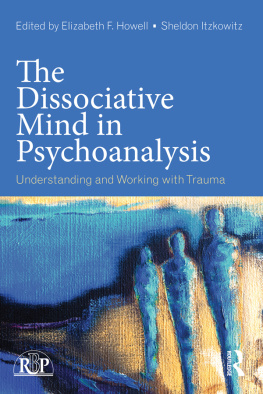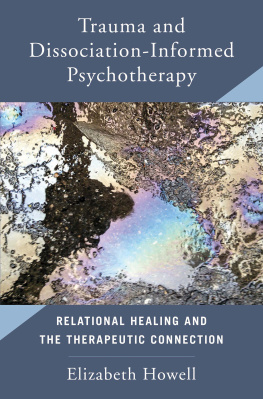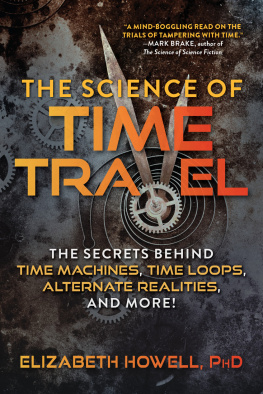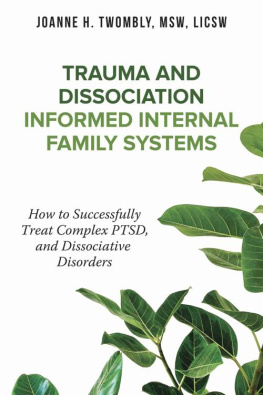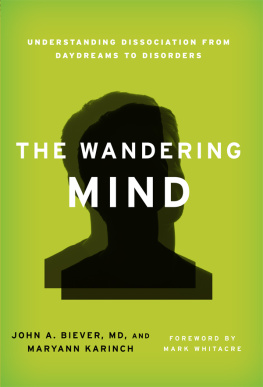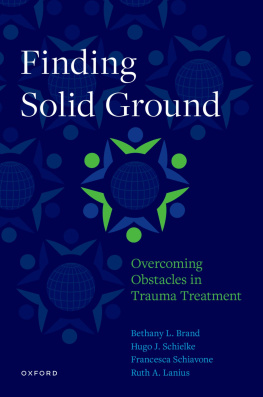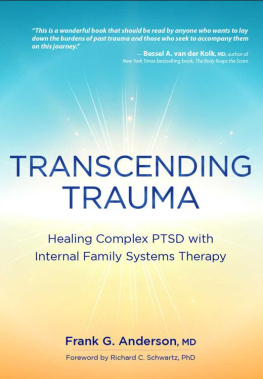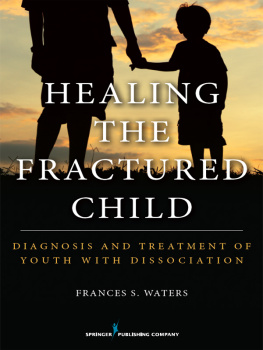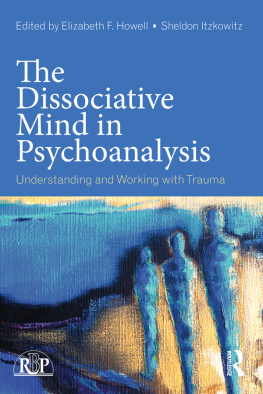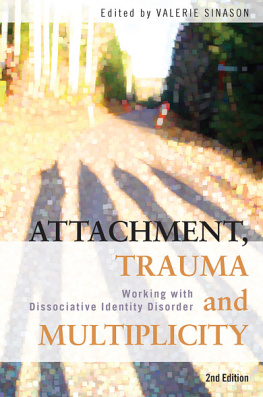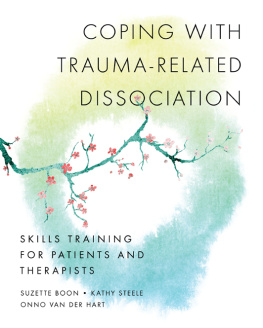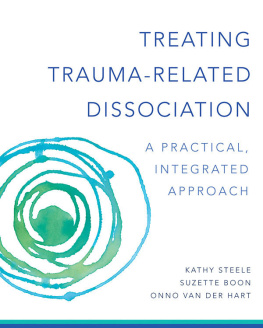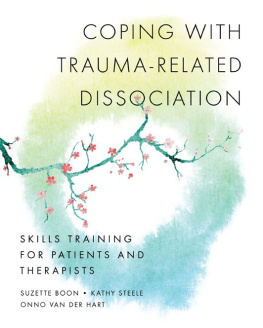First published 2016
by Routledge
2 Park Square, Milton Park, Abingdon, Oxon OX14 4RN
and by Routledge
711 Third Avenue, New York, NY 10017
Routledge is an imprint of the Taylor & Francis Group, an informa business
2016 selection and editorial matter, Elizabeth F. Howell and Sheldon Itzkowitz; individual chapters, the contributors
The right of Elizabeth F. Howell and Sheldon Itzkowitz to be identified as the authors of the editorial material, and of the authors for their individual chapters, has been asserted in accordance with sections 77 and 78 of the Copyright, Designs and Patents Act 1988.
All rights reserved. No part of this book may be reprinted or reproduced or utilized in any form or by any electronic, mechanical, or other means, now known or hereafter invented, including photocopying and recording, or in any information storage or retrieval system, without permission in writing from the publishers.
Trademark notice: Product or corporate names may be trademarks or registered trademarks, and are used only for identification and explanation without intent to infringe.
British Library Cataloguing in Publication Data
A catalogue record for this book is available from the British Library
Library of Congress Cataloging in Publication Data
A catalog record for this book has been requested
ISBN: 978-0-415-73600-8 (hbk)
ISBN: 978-0-415-73601-5 (pbk)
ISBN: 978-1-315-67921-1 (ebk)
Typeset in Sabon
by Keystroke, Station Road, Codsall, Wolverhampton
Editors
Elizabeth F. Howell, Ph.D. Author, The Dissociative Mind and Understanding and Treating Dissociative Identity Disorder: A Relational Approach; Editorial Board, Journal of Trauma and Dissociation; Adjunct Clinical Associate Professor, New York University Postdoctoral Program in Psychotherapy and Psychoanalysis; faculty, supervisor, Trauma Treatment Center, Manhattan Institute for Psychoanalysis; faculty, Psychotherapy Training Program: International Society for the Study of Dissociation; private practice in Manhattan.
Sheldon Itzkowitz, Ph.D. Adjunct Clinical Associate Professor of Psychology and Clinical Consultant, New York University Postdoctoral Program in Psychotherapy and Psychoanalysis; Guest Faculty, William Alanson White Institute, EDCAS Program; teaching and supervisory faculty, National Institute for the Psychotherapies; Associate Editor, Psychoanalytic Perspectives; former President, Division of Psychoanalysis, New York State Psychological Association; full-time private practice in Manhattan.
Contributors
Bethany L. Brand, Ph.D. is a Professor of Psychology at Towson University. Dr. Brand leads the largest treatment outcome study of dissociative disorders (the TOP DD study). Her research has provided critical insights about distinguishing genuine from feigned dissociative disorders. Dr. Brand has received numerous research, clinical, writing, and teaching awards.
Ira Brenner, M.D. is Clinical Professor of Psychiatry at Jefferson Medical College, and Training and Supervising Analyst at the Psychoanalytic Center of Philadelphia. Writing extensively, his latest book is Dark Matters: Exploring the Realm of Psychic Devastation (2014). He practices in the greater Philadelphia area, treating adults and children.
Philip M. Bromberg, Ph.D. is Training and Supervising Analyst, William Alanson White Institute; Adjunct Clinical Professor, New York University Postdoctoral Program; Emeritus Co-Editor-in-Chief, Contemporary Psychoanalysis; Editorial Board member, Psychoanalytic Dialogues and Psychoanalytic Inquiry. Author: Standing in the Spaces; Awakening the Dreamer; and The Shadow of the Tsunami. He has developed the clinical implications of working with self-states and dissociative processes as major factors in psychotherapeutic improvement.
Daniel J. Brown, B.S. has worked in various research and clinical capacities including at Sheppard Pratt Health System.
Wilma S. Bucci, Ph.D. is Professor Emerita, Derner Institute, Adelphi University; Co-Chair, Committee on Research Education, American Psychoanalytic Association; Research Director, Pacella Research Center, New York Psychoanalytic Society and Institute; Honorary Member of APsaA, NYPSI, and IPTAR; author of Psychoanalysis and Cognitive Science and many other publications.
Richard A. Chefetz, M.D. practices psychiatry in Washington, DC, was President of the International Society for the Study of Trauma and Dissociation (200203), is a Distinguished Visiting Lecturer at the William Alanson White Institute, and is the author of Intensive Psychotherapy for Persistent Dissociative Processes: The Fear of Feeling Real.
Dodi Goldman, Ph.D. is a Training and supervising analyst and faculty member at the William Alanson White Institute and former book review editor of Contemporary Psychoanalysis. He authored In Search of the Real: The Origins and Originality of D.W. Winnicott, and maintains a private practice in Manhattan and Great Neck, NY.
Margaret L. Hainer, LCSW, is a psychoanalytic psychotherapist specializing in trauma and dissociation in New York City. She teaches and supervises at the Trauma Studies Center of the Institute of Contemporary Psychotherapy.
Elizabeth Hegeman, Ph.D. is a Professor at John Jay College of Criminal Justice, City University of New York, faculty; Training and supervising analyst at the William Alanson White Institute; faculty, Manhattan Institute for Psychoanalysis; and New York University Postdoctoral Program in Psychoanalysis. She practices in New York City and wrote Valuing Emotions with her husband, Michael Stocker.
Karen Hopenwasser, M.D. is an integrative psychiatrist in private practice and Clinical Associate Professor of Psychiatry, the Weill Cornell College of Medicine. Her publications and presentations have focused on understanding somatic memory and intergenerational transmission of trauma through an integration of neuroscience, psychodynamic theory, social theory, and philosophy.
Donald E. Kalsched, Ph.D. is a Clinical Psychologist and Jungian analyst with a private practice in Albuquerque, NM. He is a training analyst with the Inter-Regional Society of Jungian analysts and lectures nationally and internationally on the subject of early trauma and its treatment.
Richard P. Kluft, M.D., Ph.D. is Clinical Professor of Psychiatry at Temple University Medical School, and faculty at the Psychoanalytic Center of Philadelphia. He practices in Bala Cynwyd, PA. Author of many publications, his most recent books are the text, Shelter from the Storm, and the novel, Good Shrink/Bad Shrink.
Brian Koehler, Ph.D. is Adjunct Associate Professor, New York University School of Social Work; Adjunct Professor at programs: NYU Postdoctoral in Psychotherapy and Psychoanalysis; Graduate Clinical Psychology, Teachers College, Columbia University; Graduate Psychology, Brooklyn College. Associate Editor, Psychosis: Psychological, Social and Integrative Approaches; faculty/Supervisor, Psychoanalytic Psychotherapy Study Center; faculty, Institute for Contemporary Psychotherapy. Private practice in Hastings-on-Hudson and Manhattan.
Jennifer Leighton, LCSW is a trauma informed Self Psychologist and Intersubjectivist practicing in New York City. She is a faculty member and supervisor in the Trauma Program at the Institute for Contemporary Psychotherapy. She has written about and given numerous workshops on shame as it is manifested in both therapist and patient.
Joseph Newirth is a Professor at the Derner Institute of Advanced Psychological Studies at Adelphi University, and a consultant at the New York University Postdoctoral Program. He received the Gradiva Prize for his book

